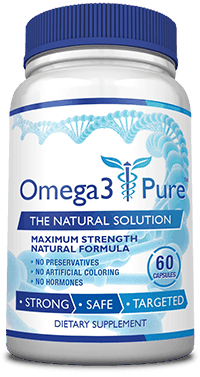The Science Behind Omega-3 Fish Oil
Does It Really Work?
What's The Science Behind Omega-3?

Omega-3 Fish oil has become popular thanks to its many health benefits and substantial clinical data to back it. It is now one of the biggest health supplements in the country.
Omega-3 fatty acids are unsaturated fats that the body needs in order to function properly. However, our body's cannot produce these Omega-3's on our own. So, we must obtain them through food and supplement intake. The two main types of Omega-3 fatty acids that are integral to the body's metabolism are called Eicosapentaenoic Acid (EPA) and Docosahexaenoic Acid (DHA).
Observed Benefits Of Omega-3 Fish Oil
- Cardiovascular Health*
- Joint Pain Relief*
- Cognitive Support*
However, not all Omega-3 fish oil products can produce these impressive results and help you reach your health goals. Make sure to choose a premium-quality product with 100% natural, scientifically-proven ingredients that is manufactured according to the highest modern standards.
Omega-3 Supplements For Your Mind And Body
Omega-3 For Cardiovascular Health:*

An often reviewed study on the effects of Omega-3 fish oil on cardiovascular health was published in The American Journal of Clinical Nutrition. The clinical trial was a randomized, double blind, placebo controlled crossover study conducted on 27 hyperlipidemic subjects. The patients were randomly divided into 2 groups, one receiving an encapsulated fish oil and the other an encapsulated corn and olive oil mixture.
After 8 weeks, the test subjects switched from taking fish oil to the placebo. Lipid determinations were reviewed after a 12h overnight fast at baseline and during the treatment at 2 week intervals. For a full review of that clinical study please Click Here.
At the conclusion of the study, tests determined that fish oil ingestion had a positive effect on hypertriglyceridemia. There was also an improvement in lipid levels and a decrease in plasma viscosity.*
Joint Pain Relief Using Omega-3:*

The most famous clinical study on joint pain relief and Omega-3 fish oil was published by The Annals of Rheumatic Diseases. A randomized, double blind, placebo controlled study was conducted over 12 week crossover periods, consisting of 16 patients suffering from rheumatoid arthritis. Patients were randomly chosen to receive either fish oil or a placebo containing coconut oil that was flavored with fish aroma.
After 12 weeks, the patients switched from taking fish oil to the placebo and vice versa. Patients were advised to keep a food diary and to continue with their regular drug treatment plan. For a full review of that clinical study please Click Here.
At the end of the study, results proved the positive effect Omega-3 fish oil has on decreasing the effects of rheumatoid arthritis. Patients saw great improvement in their joint swelling and morning stiffness.*
Effects Of Omega-3 For Cognitive Support:*

A popular study on the effects of Omega-3 fish oil on cognitive health was conducted by The American Journal of Clinical Nutrition. A randomized, double blind, placebo controlled study was conducted on healthy adults, ranging in age from 18 to 45 years old. Inclusion criteria for this study included no known major medical conditions, no use of medication for a disease, non smoking, low habitual intake of LC n-3 PUFAs, no consumption of fish oil supplements in the past 6 months, no allergies to seafood and not pregnant or lactating.
The study included 83 men and 145 women who were randomly assigned to either the fish oil or the placebo group for 6 months. Their cognitive performance was reviewed by using a computerized cognitive test battery. For a full review of that clinical study please Click Here.
Results for the study saw an improved memory and reaction time of memory in adults who had a diet low in DHA. In conclusion, adults will greatly benefit from an increased consumption of DHA, which can be found in Omega-3 fish oil.*
If you have additional questions, please visit our Frequently Asked Questions page.
References:
1 - The American Journal of Clinical Nutrition
2 - The Annals of the Rheumatic Diseases
3 - NCBI: The National Center for Biotechnology Information













